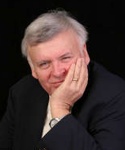Henry Chadwick Award: Paul Dickson
This article was written by Steve Gietschier
This article was published in Fall 2013 Baseball Research Journal

PAUL DICKSON (1939 – ) vaulted to the front rank of baseball researchers immediately following publication of The Dickson Baseball Dictionary in 1989. Lauded as “a staggering piece of scholarship” by the Wall Street Journal, the book won the 1989 Macmillan-SABR Baseball Research Award and quickly became a well-thumbed addition to baseball bookshelves everywhere. Dickson published a second edition in 1999, and in 2009 he produced a third edition (with Skip McAfee) that is twice as large as the first. With definitions for more than 10,000 baseball words and phrases, the book has its own website, baseballdictionary.com. A fourth edition is in the works.
Born in Yonkers, New York, Dickson graduated from Wesleyan University in Connecticut in 1961 and served in the United States Navy where he began his writing career. “I always wanted to be a writer,” he said. “When I was thirteen, I was bedridden for a while after an accident. My mother brought me a ton of books, including one written by a man who drove around the country interviewing people in anachronistic professions, like a guy who raised oxen for plowing. I said to myself, ‘You can do this for a living?’ And so I did. I haven’t gotten a real paycheck from an employer since 1968.”
That’s when Dickson stopped working as a reporter for McGraw-Hill Publications to become a full-time freelance writer. He contributed to the New York Times, the Washington Post, the Los Angeles Times, and a host of magazines, including Esquire, Smithsonian, and The Nation. He published his first book, Think Tanks, in 1971. His bibliography now contains more than sixty-six books and countless articles on a wide variety of subjects. Next on the docket is a book about sports and Jim Crow, why some sports desegregated a lot faster than others.
“I became a baseball fan in 1944 when I was five,” Dickson said. “My uncle — my hero — came home from the navy and took me from Yonkers to Yankee Stadium. He was in full uniform, so the ticket taker let us in for free and escorted us right to the Yankees’ clubhouse. Tommy Henrich was there. He was in the Coast Guard, and we watched the game from the owners’ box. I was hooked.”
The Dictionary was Dickson’s first baseball book. He took his boys to the ball park, and they were full of questions about the game and its vernacular. Dickson promised them a visit to the library to check out a book on baseball terminology, but there were none. “So I figured that this might be a good project,” he said, “with some legs.” Indeed, that is the case, thanks, in part, to the many SABR members who have contributed to each edition. “SABR is wonderful,” Dickson said. “The members are helpful, non-territorial, and non-competitive. They want to help and share.”
Besides the dictionary, Dickson has written several other baseball books, including The Unwritten Rules of Baseball, Baseball’s Greatest Quotations, The Hidden Language of Baseball, The Joy of Keeping Score, Baseball: The Presidents’ Game (with William B. Mead), and Bill Veeck: Baseball’s Greatest Maverick, winner of the 2012 Casey Award. “It’s amazing,” Dickson said, “that they are all still in print.”
Living in Garrett Park, Maryland, Dickson is close to two major league parks. “I like them both,” he said, “but going to Camden Yards is a real treat. The fans there are blue-collar. They love their team and are excited just to be there.”
For more information on the Henry Chadwick Award, click here.


